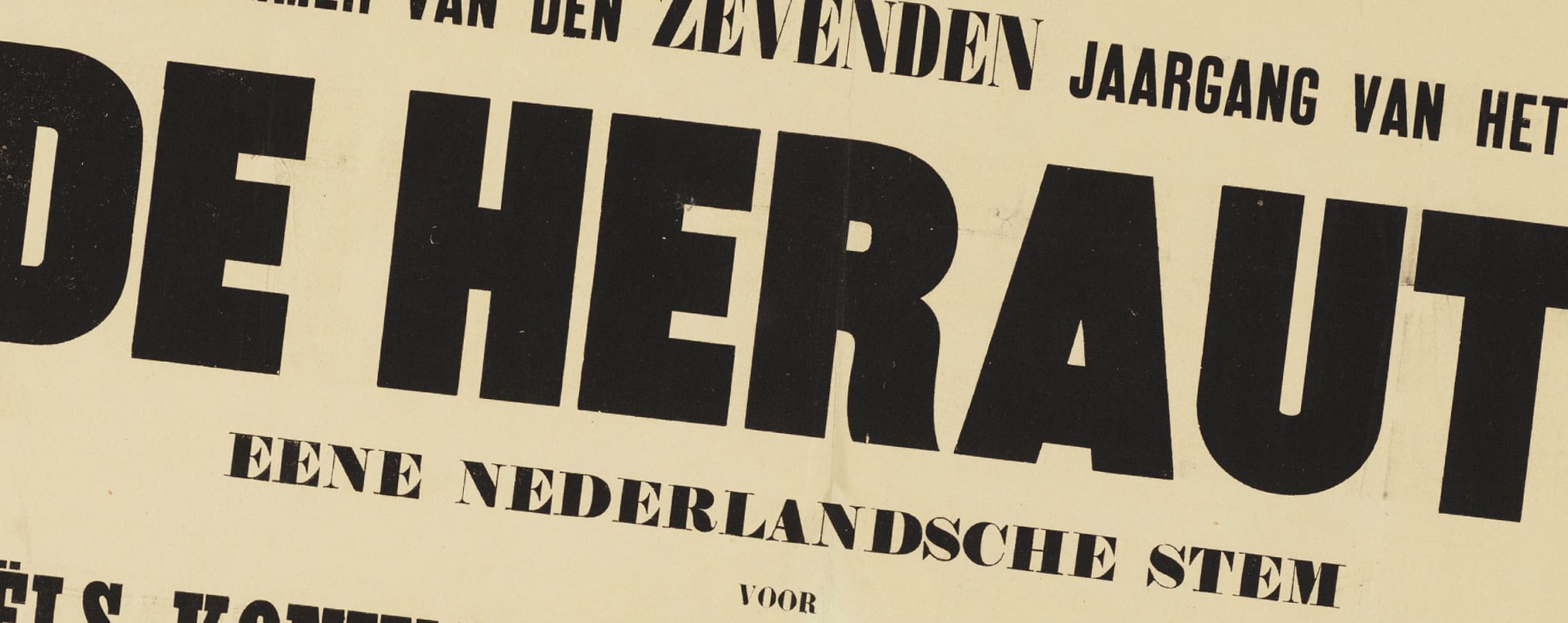S
Sphere sovereignty has a major branding problem. It is such a barbarous term to the English ear that it’s a miracle it has made any of the pitiable inroads into Anglo-world theology and social theory that it has.
It is admittedly cheeky to argue that sphere sovereignty is exactly the term needed in this moment, in a time and place that is coming apart, that is fraying dangerously not only at its edges but at its centre. But I want to make just that argument. Sphere sovereignty, while hardly the only term, is a good term, maybe even one of the better ones, to capture a core biblical theme of justice.
To make my case, I think it merits telling the story of the term’s origin, particularly with some recent historical updates. From that story we can begin to see why the term has been abused in the ways it has, yet also where its original promise lies: it offers an organic, dependent picture of human life, one realized more concretely in the tale of the two Hermans—Bavinck and Dooyeweerd. Finally, to counter the charge that sphere sovereignty is an abstraction fit for the ivory tower but useless in the halls of power, we will put this term to work in urgent realities of the present day: the politics of a pandemic and the vital work of combatting human trafficking.
The picture that emerges from this story shows the language of sphere sovereignty shimmering, not in an overly mechanistic insistence on defending spheres from one another, but as a created order, woven—as Psalms 102 and 104 put it—like a cloth, each strand particular, but each strand dependent on the others for strength and life.
The Origins of Sphere Sovereignty
Tracing back sphere sovereignty to the origin of Kuyper’s use of the term is slippery, in part because Kuyper himself employed the term differently, depending on his audience. Where in Scripture could Kuyper have possibly imagined this term arising? What problems did it solve? How did it meet the challenge of his time with the Book of Scripture in one hand and the Book of Creation in the other?
Kuyper’s enthusiasm for sphere sovereignty is usually traced back to the thought of fellow Calvinist political thinker Johannes Althusius, to John Calvin himself, to Augustine, and—of course—to an exegesis of Scripture. This is the argument that Gordon Spykman gives in “Sphere Sovereignty in Calvin and the Calvinist Tradition” and James Skillen and Rockne McCarthy give in Political Order and the Plural Structure of Society. Simon Kennedy likewise argues in “Abraham Kuyper and His Political Thought: Calvinist and Pluralist” that Althusius’s pluralist political theory was the context for “all subsequent Calvinist political thought.”
This story fits the theology, and certainly fits the picture Kuyper had of himself. The problem, as renowned historian George Harinck argues, is that it’s wrong.
Kuyper’s first use of the term “sphere sovereignty”—in Dutch souvereinteit in eigen kring—was in the Dutch newspaper De Haraut in September 1870. But by far the most significant exposition of the term came in his opening address at the Free University of Amsterdam in October 1880. According to Harinck, this puts the term alongside several others—like special and common grace, institution and organism, and even worldview—that he had used off and on since his early career, but sometimes with different emphases in different settings.

The first of those settings was ecclesial, as an argument about why the church should not be subjected to the state. Using sphere sovereignty, Kuyper argued against the power of the state usurping the rightful authority of the church and—further to his arguments later in his career—against an established state church as a violation of freedom of religion at its most basic level, effectively precluding social and political pluralism. That Kuyper clearly saw this as working out the basic of premises of Calvinism is true, an argument he makes at great length in “Calvinism the Origin and Safeguard of Our Constitutional Liberties” (1874). But, says Harinck, there is little evidence that he drew specifically on Althusius or even Calvin himself in articulating it. In fact, Harinck says, the idea seems to have been a unique intuition of Kuyper’s drawing on not only the ideas in the society around him—the idea of spheres of life had been developing for some time before Kuyper—but also his Calvinist instincts (which, of course, were shaped insensibly by Althusius and Calvin). When faced particularly with the challenge of what he considered state overreach, Kuyper intuited a term that first defended the liberty of the church against the state and then developed real ontological status for the whole of human life.
A term that began as a declaration of freedom for the church eventually became centrally focused on state and society, defending the diversity and dignity of human life against what Kuyper saw as the “curse” of uniformity. Among the more implausible of Kuyper’s aphorisms is my personal favourite from his Lectures on Calvinism: “The state is not an octopus!” What Kuyper saw, prophetically, was that the coming twentieth century would be dominated by this challenge of statism predicated on uniformity, whether ethnic or religious. What was needed to meet that challenge, argued Kuyper, was an idea of authority in which God specifically validates and celebrates the diversity of human life, such that the power of no other single sphere of life—the state at the front of his mind—may pervade it or snuff it out.
A term that began as a declaration of freedom for the church eventually became centrally focused on state and society, defending the diversity and dignity of human life against what Kuyper saw as the “curse” of uniformity.
We can forgive Kuyper for his preoccupation with the expanding powers of the state because history has proved him right. The twentieth century’s graveyards are filled with the victims of states—of whatever economic arrangement—exercising their Leviathan grasp over life and death. We might also experience an appreciation for the use of the term “sovereignty,” suggestive as it is of a vigorous defence of the integrity and autonomy of human institutional life against tyranny.
But this does not give us much sense of what a sphere actually is, what its limits and boundaries, its essence and created intentions are. How can such a defensive term show the interrelated dependence of so much of human life? Kuyper, curiously, never developed the term much himself and left much of this vague. It was up to two of his disciples to fill in these gaps. That leads us to the next chapter of the story: the tale of the two Hermans.
Organic Sphere Solidarity
This chapter attempts to answer the charge that the defensive posture of sphere sovereignty implies a divisive perspective on human social life. Sovereignty—independence from authorities of a similar kind—is usually paired in the Anglo political imagination with coercive defence from those other authorities. The origin of sovereignty, as the story is unhappily (and wrongly) told, is about the rise of political power free from religious interference and the pope. We can certainly see from above why Kuyper might have resonated with that. But what if we put our emphasis on spheres, not just sovereignty? That is, can we imagine a plurality of unique social spheres, not hostile to and independent of one another, but organically interwoven? What if we pictured the spheres within the creation theology of Psalm 102 or 104, where human life is woven together like creation itself—plural and distinct, yes, but dependent?
This is the picture Herman Bavinck gives us. Bavinck argues that a better way to understand the spheres of human life, and the diversity of created order generally, was not industrially or mechanistically but organically: God has patterned creation and human life on his own being. Because God is triune—that is, united and diverse in his very nature—creation is also united and diverse. Bavinck writes, “Everything was created with a nature of its own and rests in ordinances established by God. Sun, moon, and stars have their own unique task; plants, animals, and humans are distinct in nature. There is the most profuse diversity, and yet, in that diversity, there is also a superlative kind of unity. The foundation of both diversity and unity is in God.”
Unity in diversity is a special challenge for human life. Human history is littered with opposite ends of that pendulum, the tyranny of unity through uniformity or the fragmentary polarization of authenticity and individualism.
This is the fundamental insight of Kuyper’s sphere sovereignty—that God creates human life and its potentialities with startling diversity, yet all are interwoven, interconnected, organic. Human beings, as well as human social and institutional life, bear the marks of this image of God, so that no matter how much invention, differentiation, and distinction we may have, all human life relapses on and depends on all other parts to flourish. We receive these spheres and their diversity as the most astonishing gift. And yet God does not leave us alone with that gift but in his mercy offers to teach us how things should go in and between these spheres that he has made. Hence, in traditional Calvinist fashion, law—or God’s good news of how to live well in the creation he has given us—always follows gift. The law is a love letter to God’s creation.
And this is precisely where the other Herman—Herman Dooyeweerd—picks up Kuyper and Bavinck’s project. If in Bavinck we see the interconnected organic nature of the spheres—a balance to Kuyper’s understandable, if at times defensive, conception of sovereignty—Dooyeweerd does not offer balance but explanation. What, after all, is a sphere? What does God teach us about each sphere and how to live gratefully within the spheres?
Dooyeweerd uses the term “sphere sovereignty” slightly differently than Kuyper, in part to emphasize Bavinck’s insight. For the English world, I find it hard to do better than Jonathan Chaplin’s magisterial Herman Dooyeweerd: Christian Philosopher of State and Civil Society, in which he argues that Dooyeweerd’s use of the term denotes “mutual modal irreducibility” while also retaining its original meaning of “the qualitative distinction between and autonomy of various societal structures.”

Dooyeweerd identifies fifteen aspects of reality (numerical, spatial, kinematic, physical, biotic, psychic, logical, historical, lingual, social, economic, aesthetic, juridical, moral or ethical, and confessional). These modal aspects—what one scholar has called “constellations of meaning”—are not the spheres themselves as Kuyper might have talked about them (social institutions such as schools, churches, and states) but theoretical tools for understanding how societal institutions operate. Yes, it gets technical quickly, and I might have lost you, but stick with me. Each social structure has intrinsic to it a founding modality and a leading modality, which helps us understand where that activity comes from (founding function) and what it is for (leading function), without reducing it to only one of those things. The state, for example, one particular kind of a political community, is founded in power (not, for example, the biotic, physical, or confessional, contrary to the opinion of Yoram Hazony and other nationalists) and is directed toward justice. It operates in the full range of aspects: a state has budgets and finances and balance sheets, but it is not a business; its founding and leading functions help us understand what it is and what it is for. Herein is the Dooyeweerdian attempt to build a social theory that foregrounds both Kuyper’s concern for latent tyranny and Bavinck’s organic correction.
Herman Dooyeweerd may not be everyone’s cup of tea. But as I often remind critics, even if you do not like (or understand) his methods or answers, if experience causes you to believe that a plural structure of the world is more attuned to reality, you recognize that a project like Dooyeweerd’s is necessary. The Christian should not utter “worldview” or “sphere sovereignty” as if these alone answer our social and political questions. These are, at best, the beginning of the inquiry, not the end. We must now put sphere sovereignty to work and see just how this social theory balances sovereignty and solidarity.
The Christian should not utter “worldview” or “sphere sovereignty” as if these alone answer our social and political questions. These are, at best, the beginning of the inquiry, not the end.
Sphere Sovereignty and the Pandemic
Let me offer two preliminary sketches. The first is about how sphere sovereignty helps us understand and practice political power in the pandemic. Many conservatives will delight in Kuyper’s aquatic aphorism that the “state is not an octopus” precisely because it seems perfectly suited for our moment: a biopolitical state in regulatory overdrive. Sphere sovereignty ought to bust the state down to size and put it back in its place. But does it?
I’m not sure it does. Sphere sovereignty—in Kuyper’s original usage—does operate as a shield and guard against tyrannical overreach on the part of spheres, especially the state. But before it operates as a shield or guard, it must first ask the prior question: What is political power for? This question is one reason that Kuyperian political actors are often difficult to pin on the modern political spectrum defined by one’s preference for the relative size of states and markets. For Kuyper, framing the problem as one of size is the wrong way to start. We must first know what goods this sphere is rightly trying to achieve (in Dooyeweerd’s language: its leading function), and only then can we answer questions of scale and capacity. How big or small something should be is impossible to answer if we don’t first know what it should do: its proper function. And what the state does—or is supposed to do—is execute public justice.
What exactly constitutes public justice is an area where reasonable people (and Kuyperians) can disagree. The Bible gives us a rich and complex picture of justice, but it tends to be longer on ends and shorter on means, particularly ones that would be easy or fair to adopt in pluralist, modern differentiated democracies. Here we need the biblical virtue of wisdom—how to gratefully live today according to the laws and norms of God’s creation. This is the only way we can answer such questions as: What is justice? Who is owed what, and how? What are the best ways to achieve this? We may know that the God of the Bible loves mercy and detests dishonest scales, but what exactly does that mean for pandemic politics? Are vaccine mandates just? Are the sums of money being spent to keep the economy moving and out of recession just expenditures? Is the quantitative easing on the scale of modern monetary theory a dishonest scale? These are questions of justice, but how does sphere sovereignty help us answer them?
First, I think it helps us see the increasing differentiation and complexity of modern life, and the unique role of the state to do justice in balancing that complexity and diversity. In order for the state to do or at the very least oversee justice, it must have not only competence but also power to ensure sphere diversity and sphere cohesion. Today’s much-debated pandemic politics give us an important practical example: the state may not be charged with ensuring everyone’s health, but it does have a special task for social, economic, and political stability. Is it an obligation of justice to meet a global pathogen on behalf of its population, and if so, what types and size of political tools would be needed? What would the reasonable limit of those tools be, and where—perhaps even as important—are the limits between what a population in panic might demand and what a state’s limited role of justice might permit?
This could make for a very large state in some areas but also a very small state in others—it depends on the needs of justice and the realities of the day. There was no national health-insurance program in Kuyper’s day. There were very few (although some) medical mandates. Even in Kuyper’s time, there was a recognition that perils and plagues may need spirited political power to organize common action.
But that also means that we—in such perilous times—may need a kind of political power precisely to meet the diverse demands of justice in a time of pandemic. Any such expansion should be done with the most extreme caution and substantial safeguards. The function of justice requires special power because it is especially concerned with the balance between the spheres, ensuring no one sphere snuffs out another, or another implodes in dysfunction. This special power is one of the reasons Kuyper rightly respected and feared the state.
Sphere sovereignty keeps our eye on the prize—justice—and it presses us back into the biblical record to understand what is meant by God’s justice, how people worked justice out institutionally and politically in history, and what we can learn from those decisions today. It pushes us, in other words, to have one eye on the Book of Creation (the differentiated structures of society and state) and one eye on the Book of Scripture (God’s laws and norms for how to achieve the goods for which spheres of life are aimed).
Sphere Sovereignty and Human Trafficking
If this brief pandemic primer helps us see how sphere sovereignty directs us to the created purpose, boundary, and balance of society’s structures, Gary Haugen and Victor Boutros’s book The Locust Effect gives us a picture of the irreducibility of justice and what Dooyeweerdians sometimes call the simultaneous realization of norms.
The International Justice Mission (IJM) is well known for its advocacy and work on behalf of those persons enslaved or trafficked in the international system. Slavery is more pervasive today than many believe, and IJM’s means have evolved significantly over the years to include a range of social and political tools. The key lesson of The Locust Effect is that, however we define development—in material, moral, or political terms—it happens when a variety of spheres develop together rather than one at a time. There is an irreducible complexity to what many in the social-science world have begun to call “wicked problems,” not merely complicated (like a machine) but complex (like an organism). How can we debate the efficacy of models of microfinance or the empowerment of women if the poor and their property are not safe from violence and women cannot leave their homes? If you wish to see this challenge with your own eyes, I encourage you to watch the first episode of season 7 of Anthony Bourdain’s No Reservations, in which he visits Haiti. The tremendous potential of the Haitian people is stymied again and again by a combination of political corruption, lack of education, violence, and absence of basic infrastructure.
The problem of what we sometimes casually call development is really a problem of sphere dependence. It is not unlike what Hernando de Soto describes in The Mystery of Capital, where he calls property rights the catalyst that unlocks dead capital and creates the condition for development. To have these rights you need the rule of law, and to have the rule of law you need a political culture, and to have a political culture you need an educational and social foundation. There is a virtuous organic interdependency between spheres. All of creation, including the human life that forms a part of that creation, is connected in ways that make it impossible to mechanistically fix one thing and then another separately. When an institution in human life is suffering, we cannot fix it like a battery in a car; we must attend to it like surgery in a human body. This is a cardinal insight of Kuyperians and Dooyeweerdians: we are not machines; we are more like ecosystems, patterned that way because we are made in the image of a Triune God.
This is also the conclusion that Haugen and Boutros reach in their work at IJM: that the situation, as Kuyper would put it, calls not only for the physician but mostly certainly for the architect as well. If we care about human trafficking, we also need to care about police corruption, labour-force participation, the cultivation and distortion of sexual desire, labour law, and the necessary if sometimes inscrutable relationships between other no less organically dependent spheres like fractional reserve banking, international property rights, term limits, and constitutional litigation. These areas of human activity are not reducible to each other, but they are dependent on each other. They are sovereign in their own spheres, but they are not mechanistically independent. They are, as John Calvin put it, a theatre of God’s glory or, as the Psalms remind us, a created order, woven as God’s glorious garment.
“Sphere” and “sovereignty” are ultimately terms that I think would be smart to keep together. We are in danger of overemphasizing diversity as a pluralist potpourri, a good for its own sake. In doing so, we sometimes commit the error of fraying the ties that bind these diverse aspects and structures together.
But sphere sovereignty also, I think, manages to hold together both tensions. It reminds us, on the one hand, that God has created social institutions with their own ends and made them for their own goods. On the other hand, these goods, especially human ones, stand as images of a relationship with God, a God who made us with inherent patterns, as creatures of diversity but also of unity.
A teacher once told me he knew why people criticized the term “worldview”: it was fraught with problems and he was candid about them. But, he said, if we were to jettison the term, we’d need to invent a pretty similar one to express its core abiding truths. I feel the same way about sphere sovereignty. It has plenty of problems. But as both a curb on tyranny and a guide for grateful living, it brings us at least a small piece of the good news that is the gospel. We could do without it, but then we’d be in a hurry to construct something new surprisingly like it.


